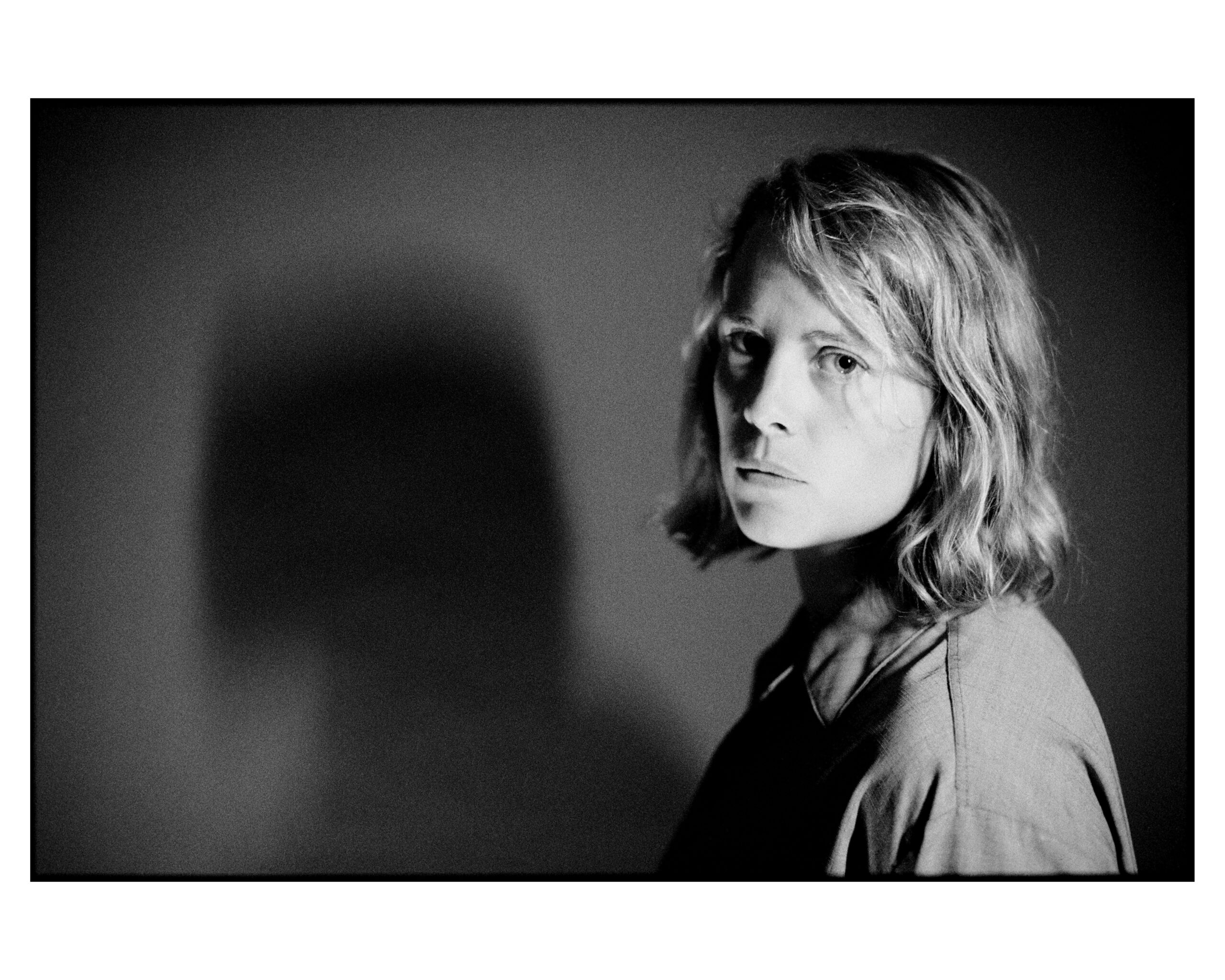Foto-© Steve Gullick
Marika Hackman beschreibt ihren kreativen Prozess als das Hacken eines Eisblocks, um das goldene Ding in der Mitte freizulegen. Sie erklärt, dass der Block einfriert, wenn man ihn zu lange liegen lässt, und dass das Leuchten schwächer wird. Während der Pandemie war ihre Kreativität wie gelähmt,sie litt unter Angstzuständen. So hörte sie auf, Lieder zu schreiben, bis sie eines Tages auf der Toilette in einer Kneipe einen Song hörte, den sie zuvor aufgenommen hatte. Dieser war der erste Riss im Eis und der Grundstein für ihr heute veröffentlichtes viertes Album Big Sigh (via Chrysalis).
Per Zoom haben wir mit der britischen Singer-Songwriterin über ihr intimstes und klanggewaltigstes Album gesprochen. Wir erfahren, warum der Entstehungsprozess Qual und Belohnung zugleich war, wie sich ihr Verhältnis zu den Songs im Laufe der Zeit verändert hat und warum sie Big Sigh als Akt der Erlösung und des Loslassens versteht.
 Congratulations on your new album that is about to come out. Let’s start with the title Big Sigh. What does it stand for?
Congratulations on your new album that is about to come out. Let’s start with the title Big Sigh. What does it stand for?
It is letting go, a big release, but not necessarily an easy one. There were a lot of big sighs when I was making this record. When Sam [Petts-Davies] and I were in the studio, whenever one of us did a big sigh, the other one would be like, “Oh, big sigh.” It became a bit of a catchphrase for the record. As the record started to take its final shape, I realized that it is a song. It is all about dynamics. There are these moments to me that feel like big expressions of release, like the end of Hanging, for instance. That is the biggest sigh on the record. It is such an introspective record. You need to have that feeling of relief, after you have dug deep and pulled up stuff from the past. You get it out, you release it, and it is done.
It is a record of big sighs, it is an introverted record, but it is also a record that stands for time. So there was a blank space of not writing before you did the record. And there was a blank space of waiting after you recorded it.
The time that it took was a big, big factor in making this record. It certainly is the longest record it has taken me to make. And there are many different components to that and as to why that happened. It is not something I am particularly fond of. You can tell yourself as an artist that immediacy is the most important thing and capturing stuff in the moment and being quick, honest, and direct is what you are going for. Being forced to take so much time was very difficult. It leaves so much room to re-analyze what you have done. There is a lot of room for losing that immediacy and for overthinking. But I definitely learned how to consciously not overthink, which was very useful, actually. But I found it very unpleasant to have to sit with it for so long. I lost sight of what that record was. Because we were so linked together for so long, I could not really see it properly. Now releasing it, looking at it with fresh eyes and hearing people’s fresh perspectives on it has been such a fantastic experience. It has made it feel like a record for me now, rather than a kind of notebook.
I wonder how the transformation from it being you to it being a record over time or due to time defines your relationship to it now. Do you look at the songs as songs, as pieces of art, from an outside perspective or are they still part of you? Or is it possible to have both?
I feel like all my records are parts of me. If you are taking personal subject matter, which I always am, remove that from yourself and turn it into something, you can look at objectively. It is very helpful to potentially painful stuff. It feels like a removal. It feels like you are pulling it out of yourself, and then you are able to look at it. With Big Sigh I see it as a record that is as separate from me as my other ones are. There is no ever full separation. It would not exist, if I did not exist. But during that time spent, it felt too much like a part of me. It was very hard to look at it objectively. But I love it as a record, so maybe that was actually very good. I did not work like this before. It has made the record incredibly intimate.

Did you ever actively think about whether you wanted to be that intimate and vulnerable and whether you wanted to change your sound? From a personal perspective, but also from an industry perspective, it can be a risky thing to do.
So much of what was in my mind with making this record was so focused on just getting songs. I have never really thought about a concept or what I was doing. Which I think is why it has been able to be like that. I think musicians can occupy a space that people feel like they cannot do themselves, which is why we become fascinated and attached to music. You can watch a rock star strutting around on stage and acting like a bit of a dickhead, and it is activating a part of you that you cannot do in your everyday life. That becomes exciting and something you want to be a part of, and it becomes an escape. The flip side of that coin is someone being vulnerable and honest in front of people, putting something into the world that is like potentially painful and difficult. It has the same effect. It is the thing that connects. It is the thing that people like. It stirs something in people to be able to listen to someone doing that. That is what I find with the music that I listen to. Even though it was not a conscious decision, I think that previously I had been quite concept heavy with my records and even if they felt like more of a risk, this is certainly the most honest. I have been able to get to this point by being on that journey: playing around with more direct lyrics and take it full circle with everything I have learned and actually just write music that comes straight from me. It has been such a good learning experience for me as a songwriter making this record. We will see where that goes next. It certainly is vulnerable, but I think it is more exciting than scary.
You said before that making the record was like carving it out of an ice cube. That needs a lot of willpower but also precision. How did you balance to dig into it and find the core, but also knowing when to stop?
I suppose that is a universal thing for any record that anyone makes. Knowing when to stop is very, very important. With this one, I feel like the record told me when to stop. It had taken such a long time, and I was a bit disillusioned with it all. There was a point when I was just like, “Okay, this is great, this is it.” I did not need to keep pushing myself. I have other songs that did not make it onto the record that I could have maybe sat down and turned into something that I liked. But how long do you keep doing that for? I am very much a believer in just letting things lie as they are. When it comes to mixing and things like that, I am not super fussy about changing every tiny little thing. It will be what it will be. If you have not heard the different versions, it does not matter. You are listening to it with fresh ears. It just kind of emerged out of that block of ice. The record and my kind of stamina is what led me to the realization that this was it. It is ten tracks. It is not sprawling; it is not vast. But it is concise, and it packs an emotional punch and that is the record. It does not need to be anything else.
 At the same time, you said that it was one of the most painful experiences to make that record. Why would you want to go through this? What kept you going? What is the good part about it?
At the same time, you said that it was one of the most painful experiences to make that record. Why would you want to go through this? What kept you going? What is the good part about it?
There are good moments, when you finish writing a song or you start writing a song and you can tell it is good. Those moments can sustain you for a very long time. Or when you are starting feel it connecting properly in the studio. Those are good moments. They keep you going. Obviously, the longer that is stretched out over, it is harder to hit those moments. But it is enough. And then, of course, when it is finished. With this record, even when it was finished, I do not think I really sat down and felt like, “Here it is.” For me, that moment has actually been over the last few weeks, starting to do interviews, seeing reviews and people being able to hear it and say how that has affected them. That has been where that catharsis has been laying for me. I was sort of numb by the time it was finished, and then I knew I was going to have to wait such a long time before it could come out as well. Now I think the payoff is turning around and being like, “Oh my God, yes, I did do that.” I did make this record and it does exist and I can hold it in my hands. And now, in classic me form, even though I have just had a very hard experience of making a record, I am very, very excited to make the next one. So, I am already thinking ahead. It is some kind of fuel in there that keeps you going.
Big Sigh is very layered and varied, you find something new each spin. How did that happen? Did you put it on bit by bit, or did you go in with that idea from the start?
I definitely had an idea of what I was going for before I came into the studio. I make quite elaborate demos at home. It is not just me sitting with a guitar. I flesh it all out and write parts. So, with the bulk of the tracks, I knew how they were going to sound. I wanted dynamic contrast, but I also wanted tonal contrast. I wanted these sorts of rural, pastoral sounds and scenes rubbing up against the heavy industrial metallic kind of synthetic sounds to create drama. But in not in an over-the-top cheesy way. I wanted gentle drama or an unnerving kind of drama. I wanted it to sound cinematic, but I also wanted it to sound intimate and close. It was about capturing those moments in which songs would be the best vehicles for those different sounds to kind of express themselves in.
 The next step is playing them on the road. Where does touring fit in in your identity as an artist? Is there a normal state and would that be playing live?
The next step is playing them on the road. Where does touring fit in in your identity as an artist? Is there a normal state and would that be playing live?
I see my life and my work is defined into three different parts. You have writing, recording, and then campaigning and touring. They are all so, so different in the way that I have to be and the role that I have to play in each of those. For me, touring is always at that kind of pinnacle moment after you have done all this work behind the scenes and then you put it out into the world and you get to connect with an audience directly. Which is very, very enjoyable. It is a complete fantasy, it is not the real world. It is a very strange thing and I love it for that. You go off in a van with four of your friends, and you are completely removed from the real world for a few weeks. Your sole focus is just to play a set every evening that you know how to play and that is very enjoyable to play. There is something in the simplicity of that that is very attractive. You could really lose your identity as a functioning adult because it is not real. You never have to wash up, there is no mundane life stuff in there. That is what I love about it, because I can dip into that for two weeks and then have a break and dip in for another two weeks. But it is never these vast, kind of sprawling stretches. It almost feels like a bit of a brain holiday from the real world.

Is there one specific thing that gives you back the most?
It is just a feeling of connection that is very hard to describe. You can tell when an audience is really invested in what you are doing, and they are really listening, and they are really connected. Even if they are a quiet audience, there is something very powerful about that. When you are on the stage and you are standing in front of lots of people, you can tell when people are not listening. You can hear people chatting, you can hear people singing. You can hear it all. When something clicks and you are connecting and you feel locked in, that is a great, great feeling.
How do you feel before and after a show? What’s the usual emotional journey of an evening?
With my last record, I had been consistently doing this for so long, I had started to lose my nerves. This time around, I will be probably quite nervous getting back into it and reminding myself that I can play my instrument and sing. It is a funny atmosphere backstage. We are all a bit nervous, being a bit stupid, probably, and trying to distract ourselves, get on and play the show. The thing is, the more nervous you are, the bigger the payoff afterwards. There is a huge surge of adrenaline and relief and fun, and you are just buzzing and you feel amazing. That warm post-show glow is also another lovely thing. When you come back off a tour, you find yourself feeling really buzzed around 9 p.m. and you do not know why. It is because you have just been in a cycle of having an adrenaline spike every evening for a month.
Thank you for the interview!
Marika Hackman live:
11.04.24 Berlin, Hole44
12.04.24 Hamburg, Molotow
14.04.24 Köln, Artheater










